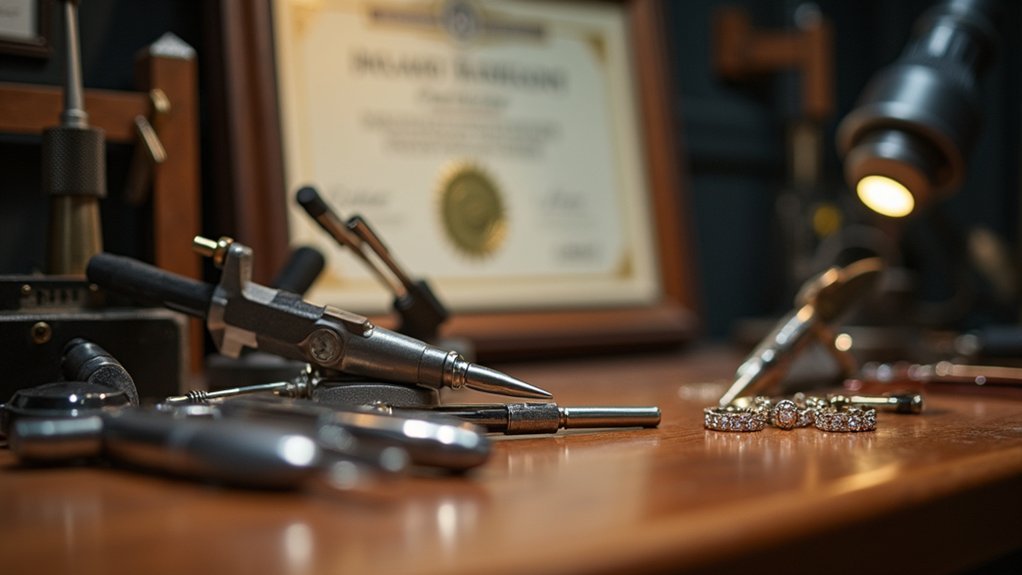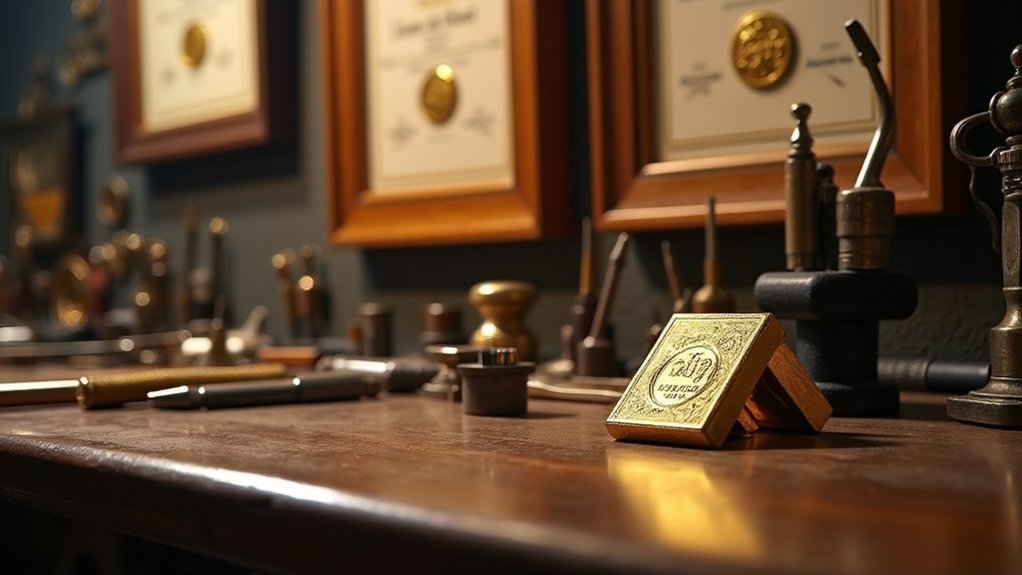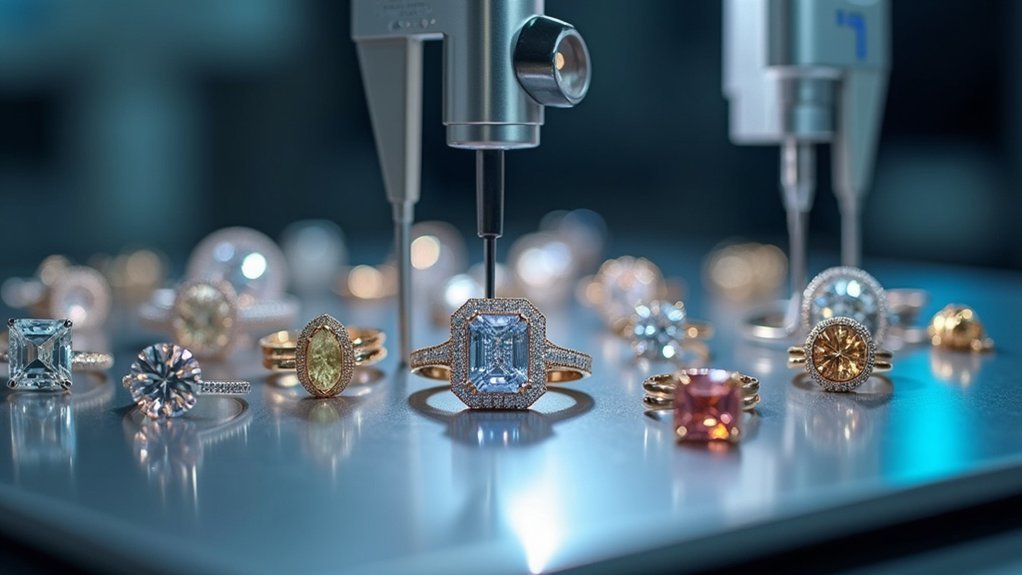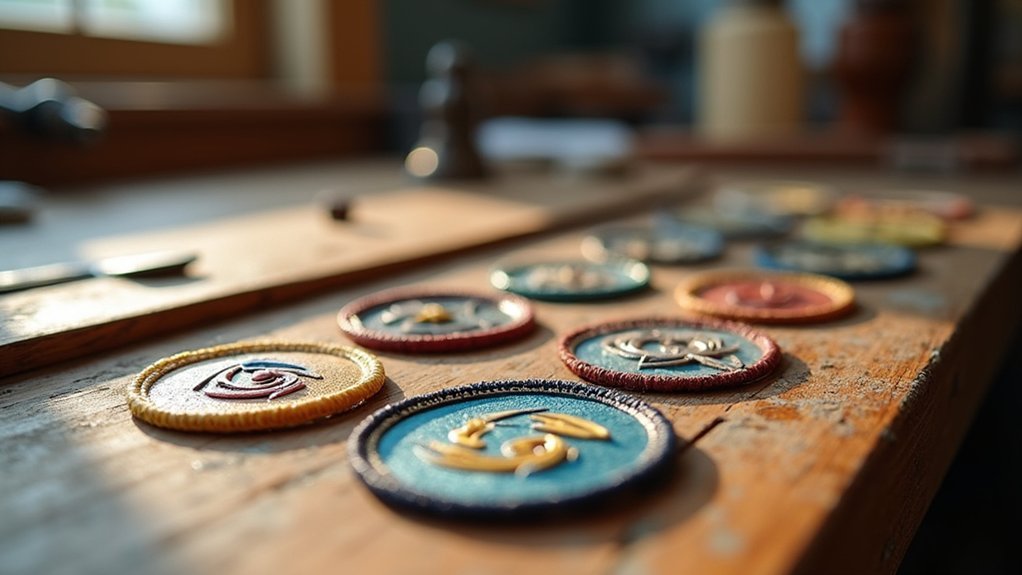You’ll transform your artisan career with these seven manufacturing technology certifications: Certified Jewelry Manufacturing Technician (CJMT) for essential design and fabrication skills, Precision Casting and Investment Technology for mastering complex geometries, Computer-Aided Design (CAD) for digital jewelry modeling, Certified Precious Metal Fabrication Specialist for advanced metalworking techniques, Gemstone Setting and Assembly Technology for specialized stone work, Quality Control and Inspection Systems for maintaining excellence standards, and Automated Production and Equipment Maintenance for modern manufacturing processes. These credentials open doors to enhanced opportunities and industry recognition.
Certified Jewelry Manufacturing Technician (CJMT)

The Certified Jewelry Manufacturing Technician (CJMT) certification equips you with essential skills in jewelry design, fabrication, and finishing techniques that today’s industry demands.
You’ll master critical areas including gemstone setting, metalworking, and quality control practices that guarantee exceptional craftsmanship. This thorough program deepens your understanding of materials, tools, and processes necessary for creating high-quality jewelry pieces.
The CJMT stands among premier Manufacturing Certifications, serving as a recognized mark of excellence that notably enhances your career prospects.
You’ll gain proficiency that opens doors to diverse opportunities as a jewelry designer, bench jeweler, or quality assurance technician in jewelry production. This credential validates your expertise and positions you competitively in the specialized jewelry manufacturing sector.
Precision Casting and Investment Technology Certification
You’ll master casting process fundamentals that form the backbone of precision manufacturing, from understanding metal flow dynamics to controlling cooling rates for peak results.
Investment molding techniques become second nature as you learn to create complex geometries using wax patterns and ceramic shells that deliver exceptional surface finishes.
Quality control standards guarantee you can evaluate cast products systematically, identifying defects and maintaining consistency that meets aerospace, automotive, and jewelry industry requirements.
Casting Process Fundamentals
While precision casting demands both artistic skill and technical expertise, earning a Casting Process Fundamentals certification equips you with the essential knowledge to master mold design and metal pouring processes.
This thorough program covers multiple casting methods, guaranteeing you’ll understand each technique’s unique advantages and applications.
The certification provides vital skills in:
- Sand casting, die casting, and investment casting methodologies
- Metal and alloy properties for ideal material selection
- Quality assurance protocols and inspection techniques
- Industry standards compliance for cast components
- Advanced mold design principles and pouring processes
You’ll develop expertise in casting process fundamentals while learning essential quality assurance measures that confirm your products meet rigorous industry specifications.
Completing this certification greatly enhances your employability and credibility, demonstrating your commitment to mastering foundational casting technologies in today’s competitive manufacturing landscape.
Investment Molding Techniques
When you need to create intricate metal components with exceptional dimensional accuracy, Investment Molding Techniques certification provides the specialized expertise required for precision casting excellence.
This certification equips you with thorough knowledge of investment casting principles, material selection, and mold design fundamentals. You’ll master complex casting processes through hands-on training that covers mold preparation, pouring techniques, and finishing procedures essential for producing high-quality components.
With investment molding certification, you’ll enhance your skill set to meet stringent industry standards, greatly boosting your marketability in competitive fields.
This specialized training opens doors to career advancement opportunities in aerospace, automotive, and medical device industries where precision manufacturing is critical. You’ll gain the technical expertise needed to produce intricate components that demanding applications require.
Quality Control Standards
Because manufacturing defects can cost companies thousands of dollars and compromise safety standards, the Precision Casting and Investment Technology Certification emphasizes rigorous quality control methodologies that guarantee consistent product excellence.
This certification transforms you into a quality-focused professional who can implement industry-standard protocols throughout casting operations.
You’ll master critical skills that employers actively seek when hiring skilled artisans.
Key certification components include:
- Mold design optimization for defect prevention
- Strategic material selection procedures
- Advanced defect identification techniques
- Real-world quality control implementation
- Theoretical knowledge combined with practical applications
Earning this credential greatly enhances your professional credibility and positions you as a Certified Manufacturing Technologist capable of maintaining rigorous quality standards.
You’ll gain competitive advantages in specialized casting operations while opening doors to advancement opportunities within the manufacturing sector.
Computer-Aided Design (CAD) for Jewelry Manufacturing
You’ll master essential CAD software fundamentals that form the backbone of modern jewelry manufacturing, from basic modeling techniques to advanced surface creation tools.
These programs like RhinoGold and MatrixGold offer specialized features that translate your creative vision into precise 3D models ready for production.
Learning jewelry design applications within CAD systems enables you to create complex geometries, set stones virtually, and generate accurate prototypes that reduce material waste and production time.
CAD Software Fundamentals
As jewelry manufacturing evolves into an increasingly digital landscape, CAD software fundamentals have become indispensable skills for modern artisans and designers. This Manufacturing Technology enables you to create precise 3D models and intricate designs with unprecedented accuracy.
You’ll discover that mastering these tools considerably reduces design time and errors while accelerating prototyping processes.
CAD fundamentals provide manufacturing professionals with essential capabilities:
- Enhanced visualization and manipulation of complex jewelry designs
- Faster modifications and customization to meet specific client requirements
- Streamlined collaboration with manufacturers and fellow designers
- Reduced production errors through precise digital modeling
- Increased job prospects as employers prioritize CAD proficiency
You’ll find that CAD mastery transforms your approach to jewelry creation, opening doors to innovative design possibilities and career advancement opportunities in today’s competitive manufacturing environment.
Jewelry Design Applications
CAD software transforms jewelry design by offering specialized applications that cater specifically to the unique demands of creating rings, necklaces, earrings, and other precious accessories.
You’ll find programs like RhinoGold, MatrixGold, and JewelCAD provide sophisticated tools for modeling intricate details and precise gemstone settings. These platforms integrate manufacturing principles with artistic vision, allowing you to create detailed 3D models before production begins.
You’ll benefit from automated processes that streamline your design workflow, reducing prototyping time and accelerating turnaround from concept to finished piece. The photorealistic rendering capabilities help you present ideas effectively to clients.
Mastering jewelry CAD enhances your creativity while boosting marketability, as digital design skills are increasingly valued in today’s jewelry industry.
Certified Precious Metal Fabrication Specialist

While precious metals require specialized handling and expertise, the Certified Precious Metal Fabrication Specialist certification equips you with advanced skills for working with gold, silver, platinum, and other high-value materials.
This certification program teaches you essential metallurgy principles that manufacturing engineers use to understand how different precious metals behave during fabrication processes.
You’ll master vital competencies including:
- Advanced shaping, joining, and finishing techniques for luxury metalworking
- Thorough safety protocols specific to precious metal handling
- Quality control measures ensuring consistent high-end results
- Proper tool and equipment usage for specialized fabrication tasks
- Industry standards recognition in jewelry and luxury goods sectors
The certification enhances your job prospects considerably within high-value metalworking industries.
You’ll need periodic recertification to maintain current knowledge of evolving fabrication techniques and industry advancements.
Gemstone Setting and Assembly Technology Certification
Beyond precious metal fabrication skills, the Gemstone Setting and Assembly Technology Certification prepares you for the intricate art of positioning and securing gemstones within jewelry pieces. This manufacturing certificate program combines theoretical knowledge with hands-on training, covering material properties, design principles, and equipment safety protocols.
| Certification Benefits | Career Applications |
|---|---|
| Enhanced credibility | Jewelry design |
| Improved marketability | Jewelry repair |
| Specialized skill development | Manufacturing roles |
| Industry recognition | Custom commissions |
| Competitive advantage | Quality control positions |
You’ll master various setting techniques and assembly methods essential for professional jewelry creation. The certification demonstrates your expertise to employers and clients, opening doors in jewelry manufacturing, repair, and design sectors. This credential gives you a competitive edge in the specialized gemstone setting market.
Quality Control and Inspection Systems for Fine Jewelry

As you advance from gemstone setting to the final stages of jewelry production, mastering Quality Control and Inspection Systems for Fine Jewelry becomes essential for ensuring every piece meets the exacting standards that discerning customers expect.
You’ll need thorough quality control processes that integrate seamlessly with manufacturing and engineering workflows to maintain consistency and excellence.
Professional certifications in quality control enhance your ability to implement systematic inspection protocols:
Quality control certifications provide the technical foundation needed to establish rigorous inspection protocols that ensure consistent excellence in fine jewelry production.
- Visual inspections for craftsmanship defects and surface irregularities
- Dimensional measurements using precision tools for accurate specifications
- Gemological assessments to verify stone authenticity and grading
- ISO 9001 quality management system implementation
- Certified Quality Engineer (CQE) training for advanced manufacturing processes
These certifications strengthen your technical expertise while establishing standardized procedures that protect your brand’s reputation in competitive markets.
Automated Jewelry Production and Equipment Maintenance
Once your quality control systems verify that designs meet specifications, you’ll move into the domain of automated jewelry production where advanced machinery transforms your concepts into finished pieces with unprecedented precision.
You’ll operate CNC milling machines and laser cutters that demand expertise in both equipment handling and design software. NIMS Certification validates your machining competencies, while Six Sigma Green Belt training optimizes your production processes and reduces defects.
Equipment maintenance becomes your priority to guarantee consistent precision and minimize costly downtime. You’ll perform regular checks on polishing machines and automated casting systems.
Understanding metallurgy helps you select materials that withstand automated production rigors. Continuous learning keeps you current with AI and machine learning advancements reshaping jewelry manufacturing, making you indispensable in this evolving industry.
Frequently Asked Questions
How to Become a Certified Manufacturing Technologist?
You’ll need a high school diploma and relevant manufacturing experience. Then you’ll register for the SME’s CMfgT exam, which contains 150 multiple-choice questions covering manufacturing principles, and pass it successfully.
Is SME Certification Worth IT?
You’ll find SME certification worthwhile since it nearly doubles your job prospects from 41% to 73% and increases annual earnings by $2,000 while validating your manufacturing expertise industry-wide.
Which Course Is Best for the Manufacturing Industry?
You’ll find CNC Machining Certificate most valuable since it directly addresses industry demand for skilled machine operators. It combines practical technical skills with mathematical foundations, making you immediately employable in manufacturing production environments.
What Does the SME Certificate Stand For?
The SME certificate stands for Society of Manufacturing Engineers Certificate. You’ll validate your knowledge and skills in manufacturing disciplines through this globally recognized certification that enhances your professional credibility.
In Summary
You’ll position yourself as a competitive artisan by pursuing these manufacturing technology certifications. Whether you’re focusing on traditional metalwork or embracing automated production systems, these credentials demonstrate your commitment to excellence and industry standards. You can’t afford to ignore the technological advances reshaping jewelry manufacturing. Start with certifications that align with your current skills, then expand into areas like CAD design and quality control systems to maximize your career potential.





Leave a Reply